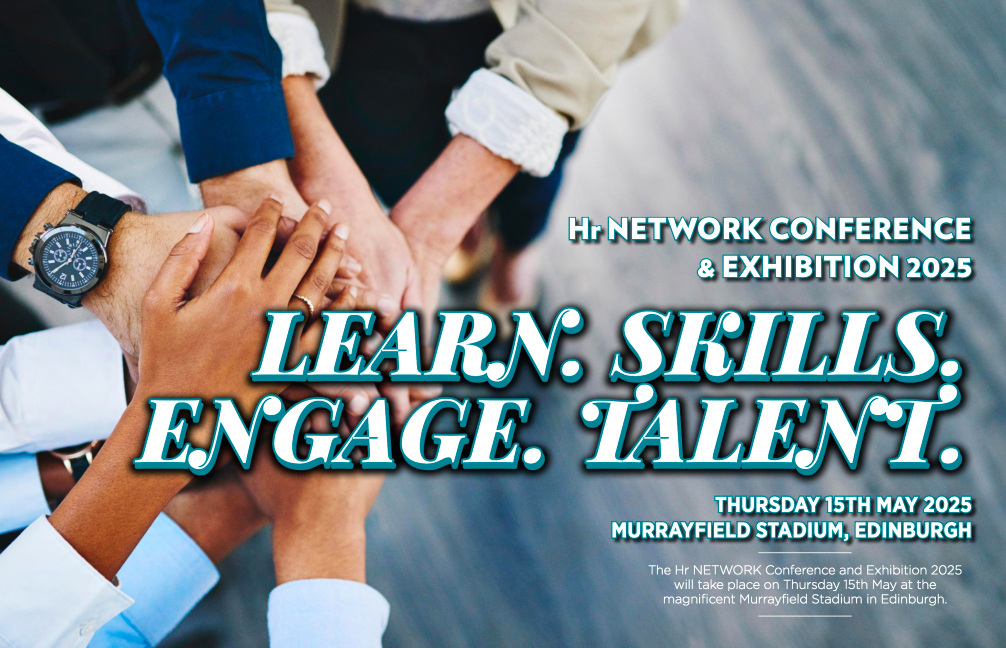Our Latest News
Learning, Skills, Engagement, Talent Management & Development the focus at this years’ Hr NETWORK Conference 2025
Learning, Skills, Engagement, Talent Management & Development the focus at this years’ Hr NETWORK Conference 2025

The Hr NETWORK ‘LEARN. SKILLS. ENGAGE. TALENT. Conference and Exhibition 2025 will take place on Thursday 15th May at the magnificent Murrayfield Stadium in Edinburgh and the Conference Planning Team has pulled together a wonderful selection of Keynote speakers from across the people landscape.
LEARN. SKILLS. ENAGE. TALENT.
Empowering growth through learning, skills, engagement and talent management has long been the perfect blend for a thriving workforce. In today’s fast moving and constantly evolving workplace, continuous learning is the cornerstone of organisational success.
The conference themes will explore how fostering a culture of learning can enhance employees’ skills, resulting in a highly engaged, motivated and talented workforce. By prioritising learning and development, organisations not only equip their teams to tackle future challenges but also nurture and retain the invaluable talent within their ranks.
Keynote speakers include Emma Simpson, Group People Director at Gleneagles & Estelle plus Katy Miller, Director of People & Development at Police Scotland.

Delegate package includes:
- 6 Keynote Speakers
- Networking & Exhibitor Area
- Lunch & Refreshments
- Delegate Bag and Goodies
- Official Conference Programme
- Delegate List
Full terms & conditions for booking are available on request and the booking form is available at the link below: https://www.hrnetworkjobs.com/events/conference/
Delegate Cost: £195+VAT
Please note the Early Bird booking discount is no longer available and from 1st March 2025, the cost per delegate is £195+VAT.
Group bookings available – Details available on request
Please note that costs quoted include full access to the Keynote sessions, Exhibitor area plus lunch and refreshments on the day.
Proactive disability managers are essential to making disabled workers feel included
Proactive disability managers are essential to making disabled workers feel included
Disability managers are essential to stopping ableism in the workplace, as organisations often do not fully enforce disability laws, finds new research by emlyon business school. The study, conducted by Lisa Buchter (Professor of sociology at emlyon business school), explored how disability managers with openly activist agendas attempted to identify and dismantle workplace ableism.
 They found that disability laws were often only partially implemented in organisations, and that disability managers are a necessity for deconstructing ableist representations and practices in the workplace. Proactive disability managers helped people to understand the law, stressed the need for recruitment over communication, highlighted relevant accommodations, and provided approaches to deconstruct ableism – diffusing it to all in the organization through training, awareness campaigns, and policies.
They found that disability laws were often only partially implemented in organisations, and that disability managers are a necessity for deconstructing ableist representations and practices in the workplace. Proactive disability managers helped people to understand the law, stressed the need for recruitment over communication, highlighted relevant accommodations, and provided approaches to deconstruct ableism – diffusing it to all in the organization through training, awareness campaigns, and policies.
Furthermore, the study revealed that several of these proactive disability managers were themselves disabled and relied on their own disclosure to create trust with disabled workers and deconstruct ableist representations and practices from co-workers.
“Despite disability laws being introduced, most companies still do not meet the quota of disabled workers in France. This, in part, stemmed from limited recruitment of people with disabilities and from the failure of organizations to accommodate and retain workers whose disabilities worsened over time. My research sheds light on the need to act at different levels to address the various forms of ableism and emphasises the importance of disability managers to engage in this important work,” says Lisa Buchter.
The research also revealed that some disability managers use their own disability status as a resource to negotiate their positions within the organisation, as they have more knowledge and expertise, and are able to relate to others more effectively. As they have personally experienced how disability stigma can negatively affect careers, their own fears over promotions and experiences with micro-aggressions, disability managers who are disabled themselves go above and beyond to make their companies truly inclusive, according to the researcher.
The study was published in the Journal of Business Ethics.
Workers still face barriers a year on from flexible working law
Workers still face barriers a year on from flexible working law
Nearly one in three (28%) workers who have requested flexible working say their request was refused because of employer fears about their productivity, despite nearly seven in 10 (68%) workers believing they would be more efficient if they worked flexibly by having control over their working hours and location of work, new research has revealed.
One year on from the introduction of the Flexible Working Act – which granted the right to request flexible working from day one – the research from Phoenix Group, one of the UK’s largest long-term savings and retirement businesses, has shown more workers are taking advantage of flexible arrangements, but many still face significant barriers.
 It found that while over one in five (21%) who engage in discussion regarding flexible working requests had successfully applied to work flexibly in the past year, the same number have had requests denied (21%) by their current or previous employer, with challenges around awareness, employer engagement and perceptions around productivity.
It found that while over one in five (21%) who engage in discussion regarding flexible working requests had successfully applied to work flexibly in the past year, the same number have had requests denied (21%) by their current or previous employer, with challenges around awareness, employer engagement and perceptions around productivity.
While flexibility at work can mean different things to different people Phoenix Insights research found that 62% of workers wanted flexibility over their hours worked and 43% wanted flexibility over where they worked – revealing a disconnect between worker and employer wants and needs.
Other reasons for requests being denied included workers feeling their employer doesn’t believe in flexibility (27%), business needs outweighing flexibility (24%) and a lack of resources to support flexible work arrangements (21%).
Most workers have not changed their working arrangements since the law came into force. Less than one-in-six (15%) workers have made changes, with over three quarters (78%) continuing under their existing arrangements. Among those who have adapted their work patterns, the most common change has been working full-time with the option to work remotely (57%), with men (65%) more likely than women (45%) to have made this adjustment.
Despite the law making it easier for employees to request flexible working, awareness remains a key challenge. Over half (55%) of workers do not know what the Flexible Working Act entitles them to, while over a third (36%) say their employer or manager has never proactively mentioned it.
Sara Thompson, Chief People Officer at Phoenix Group, comments: “The introduction of the Flexible Working Act is an important tool to help workers balance their jobs with other responsibilities and interests outside of work. It’s therefore disappointing that many are facing barriers with some employers worried about how flexibility could impact on a worker’s productivity. As the demand for flexibility grows, it is in employers’ best interests to engage proactively with their workforce and, where possible, to enable their workers to work in a flexible way, alongside managing business needs.
“Those businesses that fail to embrace flexible working risk losing talent, particularly among parents, carers, and older workers who can benefit most from greater flexibility. At Phoenix, we have fostered an environment where flexible working is the norm. Through facilitating more and better discussions, employers can tap into the potential of a diverse workforce, with flexibility having a positive impact on colleague engagement and also, ultimately helping people stay in employment for as long as they want and need while saving for their futures.”
Nearly a third of families unable to access documents after of a family death
Nearly a third of UK families unable to access important online services and financial documents in the event of a family death
Grieving families across the UK are being left in the dark about where key financial information is stored and how to access it in the event of death, leaving them in potential financial risk according to new research from Employee Benefits provider, MetLife UK. The findings reveal that 28% struggled to access important online accounts following the death of a loved one, while a further 29% said they didn’t know where important documents were stored.
 The data also highlights a significant knowledge gap around what steps people should take in preparation for a familial loss. More than one in five (21%) admitted they didn’t even know what financial or insurance policies, bank accounts, or debts had been left by loved ones creating a huge challenge to even know where to start to get affairs into place.
The data also highlights a significant knowledge gap around what steps people should take in preparation for a familial loss. More than one in five (21%) admitted they didn’t even know what financial or insurance policies, bank accounts, or debts had been left by loved ones creating a huge challenge to even know where to start to get affairs into place.
Respondents also said they would like more help from employers navigating such challenges. Around one in seven (15%) said that having been through a bereavement, they’d have liked more help with things such as contacting accountants, being an executor of a Will, or how to close someone’s bank account. Furthermore, just over half (51%) said that they would now use a bereavement planning service if it meant it could help with things like Will-writing or securely storing documents and passwords for loved ones to provide easy access after a death.
MetLife’s Group Life policy is more than just a much-needed lump sum, it gives holders free access to its Life and Legacy services.
Therefore, in addition to a life payment for the family left behind, in partnership with the “funeral concierge” provider, Everest, it also provides expert services, which both aids planning pre death and offers 24/7 assistance to family members after. This includes Will-writing services, expressions of wishes documents and a digital lockbox, for all passwords and scans of documents for employees to set up. A digital lockbox means family members get access to everything inside upon death, and they’ll then know important information such as who mortgages are with, and have access to all financial services information such as bill providers, debts, bank accounts, pensions and social media accounts.
Charlotte O’Brien, Head of Employee Benefits at MetLife UK, commented: “MetLife’s research shows that employers have a real opportunity to play a key part in supporting employees after a bereavement and ensuring their affairs are in place and providing free assistance for loved ones.
“In partnership with Everest, we want to revolutionise the Group Life market to be so much more than just a payment. We know that our unique funeral concierge service which provides support for families left behind is just as important to people. The grieving process is tough enough without the added stress of battling to get access to the critical financial information or not knowing about funeral planning or all the other legal elements involved in death.”
Supporting employees is what HR professionals most like about their jobs
Supporting employees is what HR professionals most like about their jobs
Employees are an organisation’s greatest asset and essential to the successful running of most businesses, so it makes sense that supporting them is seen as a critical function of the HR role. It’s also what draws many people to the HR profession. According to new research by Ciphr, supporting employees has been named as the top reason for why people like working in HR.
 Half (50%) of the 300 HR decision makers polled agreed that supporting employees was a key element in enjoying their jobs, while a further 47% cited hiring new employees and growing the business as their favourite aspect. Helping to improve workplace productivity and efficiency, and working with nice colleagues, are also important factors for two-fifths of respondents (selected by 40% and 39% respectively).
Half (50%) of the 300 HR decision makers polled agreed that supporting employees was a key element in enjoying their jobs, while a further 47% cited hiring new employees and growing the business as their favourite aspect. Helping to improve workplace productivity and efficiency, and working with nice colleagues, are also important factors for two-fifths of respondents (selected by 40% and 39% respectively).
Other popular aspects of the job are those that prioritise making work better, like supporting good employment practices and ensuring legal compliance (37%), solving problems (36%), and helping to create a good working culture (34%).
Ciphr’s findings suggest that most HR professionals enjoy the important work they do. When asked to share which aspects, if any, they liked most about working in HR, only one person opted for ‘none’. While some parts of the role may be more enjoyable than others, 90% of respondents could name three or more favourite things about their job (on average, they picked six).
For around a third of those surveyed, what they like most is the sense of achievement and job satisfaction that their work provides (35%), as well as a good work-life balance (33%). A similar number (32%) enjoy knowing that their work contributes to business success.
Opinions on HR pay, interestingly, are a bit more mixed. Only around a quarter (28%) selected competitive pay or a good salary as one of the main reasons why they like working in HR (ranking it in 16th place) – implying some dissatisfaction with HR compensation levels generally.
The top 15 reasons why people in HR most like their jobs are:
- Supporting / helping employees: 50% of HR professionals surveyed
- Hiring new employees / growing the business: 47%
- Helping to improve workplace productivity / efficiency: 40%
- The people they work with: 39%
- Supporting good employment practices / ensuring legal compliance: 37%
- Solving problems: 36%
- It gives them job satisfaction / sense of achievement: 35%
- Helping to create a positive and inclusive working culture: 34%
- Good work-life balance: 33%
- Supporting business success: 32%
- It’s important / purposeful work: 30%
- The HR community: 30%
- Good career progression / advancement opportunities: 29%
- They feel valued and appreciated for their work: 29%
- Learning new skills: 28%
Job aspects that didn’t quite make the top 15, besides pay, include the variety or versatility of the HR role (28%), transforming business processes (26%), and informing strategic decision-making (25%).
Claire Williams, chief people and operations officer at Ciphr, comments: “I truly believe that company performance is a direct reflection of its peoples’ performance. You can have the best strategy, products, or technology but without engaged, high-performing people, success is never sustainable. And HR sits at the heart of this – shaping cultures, enabling leadership, and driving the right talent strategies to unlock potential.”
Ciphr’s director of people, Karen Lough, adds: “Whether it’s helping someone navigate a challenge, grow into a new role, or simply feel heard and valued, those small moments add up to something big. For me, that’s the most rewarding part of working in HR and learning and development (L&D).”
Exhaustion at the Top: Over three-quarters of UK CEOs overworked and burned out
Exhaustion at the Top: Over three-quarters of UK CEOs overworked and burned out
LHH recently released the UK findings from its annual global study: ‘View from the C-Suite: Embracing the Transformation of Leadership 2025’. The report investigates the challenges the C-Suite are facing, particularly with destabilising forces at play, from inflation, to political instability and technological shifts.
The challenging economic climate, both globally and in the UK, is continuing to put pressure on the executive team. As a result, over a quarter (27%) of C-Suite executives see economic uncertainty and market volatility as the biggest external challenge for their senior leadership team.
These trying times are leading to burnout – with over three-quarters (77%) of CEOs stating that they currently feel overworked and burned out, and 80% agreeing that they would like to have more leadership support options available to them. This is having a knock-on effect on retention. Nearly half (47%) of C-Suite executives reported a turnover within the leadership team they are part of in the last twelve months. With leadership turnover high, the onus is on organisations to invest in leadership development.
When it comes to the internal challenges facing C-Suite executives, there’s a generational difference in priorities. According to the report, over a fifth (21%) view finding critical talent as one of the most significant internal challenges for senior leaders. When broken down by generation, we see a higher percentage of Gen Z (41%) leaders facing this challenge, compared to Gen X (28%).

In terms areas for improvement, 40% of CEOs believe adaptability and change management are the largest skills gaps or areas for improvement for executives within their organisation. Interestingly, nearly a third of CEOs (32%) cited strategic thinking and decision-making abilities as areas to improve.
Lack of clarity around strategic objectives is also on the mind of C-Suite executives, with 30% agreeing that it’s hindering the effectiveness of the leadership team. A lack of cohesion within the senior leadership team (26%) or unrealistic financial objectives (24%) are also cited as a hindrance.
Frances Cook, Managing Director, ICEO UK & Ireland said: “In order to combat these concerning trends, organisations need to adopt new approaches to manage senior executive talent which support leaders from both a personal and business perspective. Flexible and responsive resources are required to ensure successful internal and external transitions, enhance wellbeing and encourage adaptability amid change and uncertainty.”
The greatest asset an organisation has is its talent. With over a third (37%) of CEOs considering a change of role, direction or retirement in within the next 2-3 years, leadership development needs to be a high priority to ensure business continuity.
Internal mobility could be key to increasing confidence, particularly as nearly a fifth (19%) of C-Suite executives see retaining top talent as the internal factor that is bringing the most significant challenges for senior leaders. To enable future leaders emerging talent to thrive, training needs to heavily focus on leadership and team management skills, alongside technical expertise. For some leaders, knowing that there’s a pipeline of future leaders can instil an additional sense of confidence in their leadership, and for employees, the more invested and valued they feel, the longer they stay.








